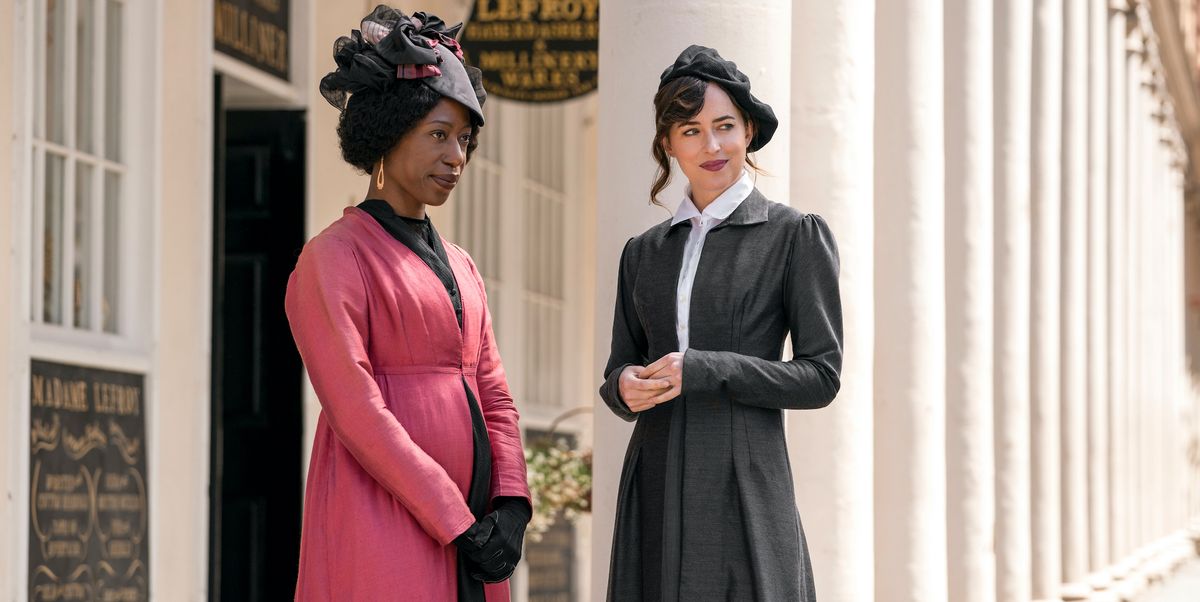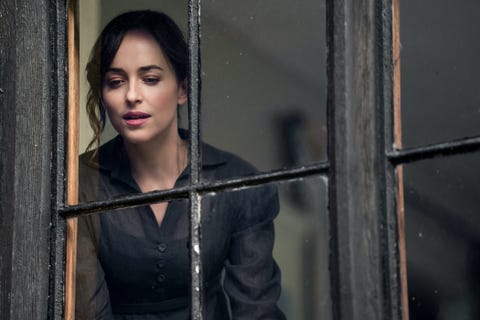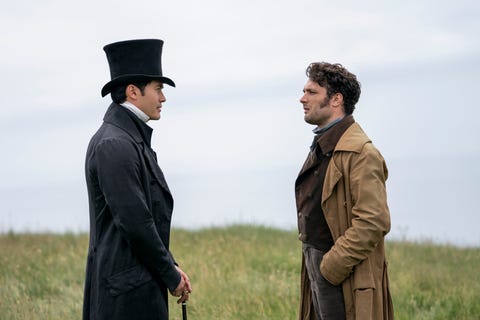Products You May Like
Perhaps the first hint that Persuasion is careening sideways sits less than two minutes into the new Netflix adaptation: The music, previously sweeping and melancholy, switches to a whimsical, cloying jaunt of plucked strings, staccato keys, and drum brushes. “Now I am single and thriving,” a luminous Dakota Johnson relays as protagonist Anne Elliot, sobbing into the bathtub and suckling from a wine bottle. In spite of this apparently all-consuming heartbreak, she is nevertheless game to deliver what’s intended as cheeky fourth-wall-breaking exposition, flashing the camera smirks as she introduces the ensemble cast of one of Jane Austen’s finest novels.
Not that Persuasion intends to do much with any of them. Despite a talented cast, inspired source material, and the green-light-means-go rubber-stamp of Netflix, director Carrie Cracknell’s Austen excursion is never anything more than fine. As no Austen purist—Persuasion isn’t one of the Austen novels I’ve read, so I can’t be accused of snobbery in this instance—I desperately wish Cracknell had taken the sort of risks that have paid off in Persuasion’s dazzling forebears, such as Clueless or Bridget Jones’s Diary. The film needn’t have been a modern re-telling, even; we’ve had more than enough fodder in that department. But sidelong gazes at the camera, alone, do not a creative adaptation make.
The film tries, in a detached, listless sort of way, to adhere to the original novel’s story. When we first meet Anne, her family fortunes have dried up, thanks to her father, Sir Walter (Richard E. Grant, extraordinary as ever), and his apparent shopping addiction. But Anne seems to have little concern over their impending move to Bath, mournful as she is for the eight years she’s suffered apart from her love, the sailor Frederick Wentworth (Cosmo Jarvis). The friend and advisor who led her astray in this matter of the heart is Lady Russell (Nikki Amuka-Bird), who persuaded Anne that marriage is transactional, not emotional. With no fortune to offer, Wentworth would have been a senseless match. “I say this with love,” Lady Russell tells Anne. “Abandon all hope.”
But Anne insists upon it; her entire character is built upon this pining. Wentworth’s rich now, a captain in the British Navy. She’s kept the “playlist” he made her; the first note he passed her in church, which reads, simply, “Bored!”; and an inexplicable cow bell that seems to have nothing to do with Wentworth at all. He’s not married, nor have any newspaper clippings indicated he’s courting. And yet, when Anne learns Wentworth will be joining her family for dinner one evening in Uppercross, she’s paralyzed.
Louisa Musgrove (Nia Towle), Anne’s sister-in-law, insists Anne pursue the dashing captain, having no idea he once shared a romance with our wilting protagonist. When they finally are reunited, she’s woefully underprepared—with a bread basket on her head and a jam mustache adorning her upper lip. Johnson is delicious in this scene, a perfect mix of bumbling and lit-from-within, but her performance crumbles like clay in the grasp of such a plodding script.
Later, after Anne plays a desperate game of musical chairs to avoid sitting next to him at dinner, Louisa plops down beside Wentworth, an excellent position from which to flirt. A blushing, flabbergasted Anne throws the audience a look that’s as much a cry for help as it is a gathering storm cloud. The rest of the evening is a disaster: She blubbers over a line about almost marrying her now-brother-in-law, and when she plays piano for the group, it serves only as the soundtrack to Louisa and Wentworth’s building coquetry. Anne doesn’t care to hide her distaste, even when Louisa confesses the next day that she’s falling for the captain.
The whole group takes a trip to Lyme to meet some of Wentworth’s Navy friends, an excursion Anne is urged into by her sister, Mary. There, the scenes trudge along, and nothing much at all happens—except that Henry Golding’s debonair William Walter Elliot appears, a welcome intrusion in the monotony. Something delightful occurs: When William locks eyes with Wentworth, their chemistry is obvious and immediate—even if fueled by spite. Here, we see what a different film Persuasion might have been, had it followed the electricity of its actors and not a false sense of winking relatability. Such a shame that Persuasion didn’t intend to retool Austen’s story with this long-ago lovers romance in mind.
In Lyme, Wentworth finally confronts Anne about their latent feelings for each other. “It’s clear to me that I want you in my life,” he says, despite all evidence to the contrary, as the seagulls circle and screech in the background. “I…I would like to be friends. I genuinely hope you find love,” he adds, and Johnson’s crushing groan of a laugh is one of the film’s more emotionally intelligent moments. Wentworth confesses to asking himself WWAD—what would Anne do?—whenever he felt inadequate at sea, and they agree: They’ll no longer be resentful exes but reconciled friends. In response to such a mature decision, a distraught Anne strolls directly into the ocean.
The next morning, she stumbles into William again, who makes his romantic interest in Anne so obvious it stings. We learn they’re actually cousins, and that he’s hated by Anne’s father because he’s the family heir. Anne seems to find this mutual disdain charming, but that doesn’t keep her from bonding with Wentworth when Louisa is concussed following a misbegotten attempt to earn Wentworth’s affection.
All of this culminates in, of course, marriage proposals. William proposes to Anne. Wentworth proposes to Louisa—or so Anne thinks. After a lot of pointless brooding that could have been solved in one straightforward conversation, everyone is eventually righted and placed into the proper relationships. There’s never any room to doubt things will turn out happy in the end.
At one point earlier in the film, Anne asks Mary, “Why must everyone always assume that all women want is to be chosen by an eligible bachelor?” But Cracknell’s Persuasion offers no evidence to the contrary. None of the female characters, apart from Lady Russell, have much interest in anything beyond marriage, love, children, and occasionally poetry. That alone is an affront to Austen, whose stories, while often centered around the marriage market, were sharp dissections of class and social aspiration. Persuasion is about just that: the social pressures of a society keen on containing women within precise, punishing boxes. But Cracknell’s film is more about the feel of Austen than the brilliance of Austen, of which it nails neither.
Aiming for something aligned with Bridget Jones and Bridgerton, but with none of their gleeful creativity or lusty passion, Persuasion takes no real risks and reaps no rewards. Anne repeatedly shoots glimpses at the camera, a la The Office, as if to say, Are you seeing this? Instead of its intended effect—camaraderie with the audience—the gesture feels better suited to checking if viewers are indeed still awake. There’s another, much better film buried in these performances, amongst the quaint set designs and cottagecore costumes. In fact, such a film might have been electric. Instead, Persuasion quietly settles for second-best.
This content is created and maintained by a third party, and imported onto this page to help users provide their email addresses. You may be able to find more information about this and similar content at piano.io


